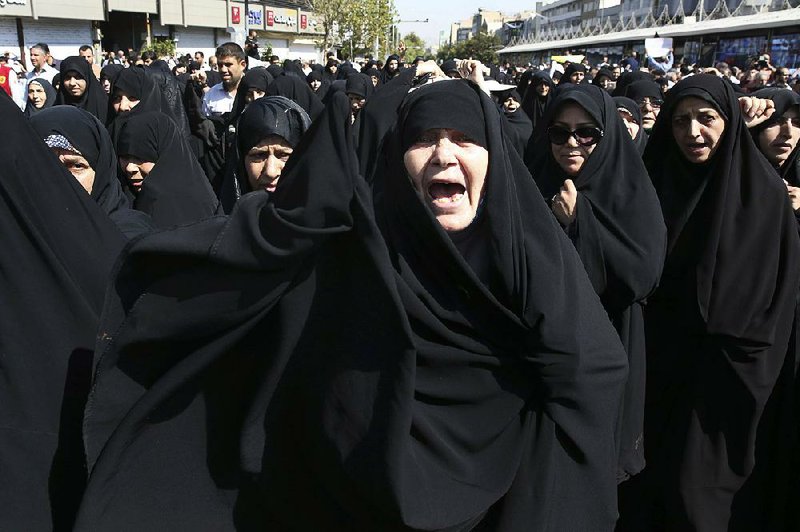MINA, Saudi Arabia -- Iran ratcheted up blame on archrival Saudi Arabia on Friday over the disaster at the hajj the previous day that killed more than 700 pilgrims, as Muslims solemnly resumed the final rites of the annual pilgrimage in the kingdom.
Thousands protested in the streets of Tehran as a senior cleric angrily demanded Saudi Arabia hand over control of the annual pilgrimage to the Organization of Islamic Cooperation, the world's largest body of Muslim nations.
Iran's state TV said the Foreign Ministry summoned Saudi Arabia's envoy to Tehran for the second time in many days to hear the Shiite powerhouse's protests over alleged "Saudi mismanagement" that purportedly led to the deadly hajj stampede.
For its part, the Organization of Islamic Cooperation said it supported Saudi Arabia's efforts to keep some 2 million pilgrims safe at the annual hajj, a pilgrimage all able-bodied Muslims must perform once in their lifetime. However, the protests and the tensions show deep friction between the Sunni kingdom and the Shiite republic.
Saudi authorities are investigating what sparked Thursday's disaster in Mina, about 3 miles from Mecca. Initial reports suggested two crowds coming from opposing directions converged on an intersection, then began pushing and shoving until a stampede began.
As of late Thursday, the Saudi civil defense directorate said the death toll was 719 but it probably would rise as bodies continued to be counted and sent to the morgue. At least 863 people were injured, the directorate said.
Countries around the world began reporting on casualties and their missing. Among those was Pakistan, which said that at least 236 of its pilgrims were unaccounted for on Friday. Egypt's Religious Endowments Minister Mohammed Mokhtar Gomaa told the state-run Middle East News Agency the death toll for his country had risen to 14.
India said that at least 14 of its citizens died in the crush, which also claimed the lives of at least four Turks, three Indonesians, three Kenyans and seven Pakistanis. Authorities in West Africa said 30 pilgrims from Mali and five from Senegal also died.
Among all those countries, Iran immediately appeared to be hardest hit, saying 131 of its pilgrims died and 85 were injured. In Tehran on Friday, thousands of people protested Saudi Arabia's rulers, chanting "death to the al-Saud family," referring to the royal line from which King Salman descends. Iranian state television showed similar protests in several other Iranian cities.
Ayatollah Mohammad Emami Kashani, a senior cleric in Tehran, called for the organization to take over administration of the hajj.
"The Saudi government and authorities involved in hajj should appear before court and be held accountable," Kashani said. "They should not lie and say, 'It was because this or that, the weather was hot, it was the pilgrims' faults.'"
The Iranian Cabinet also held an emergency meeting Friday to discuss the disaster. In the absence of President Hassan Rouhani, who is in New York to attend the U.N. General Assembly, First Vice President Ishaq Jahangiri chaired the meeting.
Jahangiri reiterated that it was "definite and clear" to Iran that "the Saudi government is responsible for this disaster ... and has to provide answers." He added that "mismanagement is definitely the cause" of the tragedy.
The hajj pilgrimage is a main pillar of Islam. This year, about 2 million people from more than 180 countries took part in the five-day pilgrimage, which ends today. The mood remained somber despite the hajj coinciding with Eid al-Adha, a major Islamic holiday.
A video posted online appeared to show a scene from the disaster. Shot from an overlooking bridge, it showed a sea of pilgrims crammed into a fenced in pathway. Stewards then appear to open a side gate allowing for an exit from the crush, leading people to surge from both directions to escape.
"Yesterday's stampede was a catastrophe. We were shocked, but we can do nothing, this was their fate," said Lolo Omar, a pilgrim from Eritrea, speaking near the site of the disaster in Mina. "We wish that Allah will facilitate our pilgrimage."
Saudi officials said most victims had ignored the allocated time slot for their groups, but criticism is mounting of the officials' handling of security.
Omar, like the pilgrims involved in Thursday's disaster, was headed toward a complex housing three columns that pilgrims pelt with pebbles in a symbolic stoning of the devil. Muslims believe the Prophet Ibrahim, or Abraham as he is known in the Bible, was confronted in this spot by the devil.
Iranian officials accused Saudi security forces of blocking two pathways along the hajj route, causing congestion and killing at least 131 of its nationals. Iran's Supreme Leader Ayatollah Ali Khamenei said Saudi authorities should shoulder responsibility, blaming their "mismanagement" for the catastrophe.
"It is not God's will. It is man's incompetence," said Mohammad Jafari, an adviser to a British tour operator that organizes hajj trips, the BBC reported.
King Salman has ordered the formation of a committee to investigate.
Information for this article was contributed by Aya Batrawy, Jon Gambrell, Ali Akbar Dareini, Zarar Khan and Omar Akour of The Associated Press and by Loveday Morris, Mustafa Salim, Brian Murphy and Sarah Kaplan of The Washington Post.
A Section on 09/26/2015
